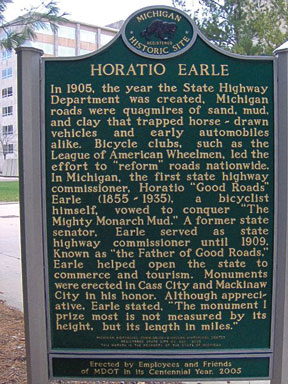In about 1774, the Potawatomi founded two villages in the area of what is now Ann Arbor
On February 14, 1824, John Allen and Elisha Rumsey staked their claim to what they called “Annarbour” and registered a plat of land west of Detroit on May 25, 1824, the earliest known use of the town’s name. They arranged for their village to become the county seat of Washtenaw County.
Allen and Rumsey decided to name it for their wives, both named Ann, and for the stands of Bur Oak in the 640 acres (260 ha) of land they purchased for $800 from the federal government at $1.25 per acre. The local Ojibwa named the settlement kaw-goosh-kaw-nick, after the sound of Allen’s sawmill
Sources:
Ann Arbor, Michigan Wikipedia entry
For other versions of the story, see The Making of Ann Arbor, Chapter 1
Following the establishment of the City of Detroit in 1701, the supply of drinking water in Detroit and its surroundings evolved from individuals collecting water daily from the river in leather buckets, to horse-driven pumps distributing river water to homes into a small network of hollowed-out wooden logs. From wooden logs to gigantic stream-driven equipment pumping thousands of gallons of raw river water, to more efficient electric pumps supplying millions of gallons of treated water for distribution through a complex network of pipes to millions of people who reside in Southeast Michigan.
From its beginnings as little more than an afterthought, sewage disposal has undergone a similarly circuitous evolution. Sewers have evolved from simple open ditches that channeled raw waste by gravity into the nearest body of water, to covered streams, to huge pipes directing flows of waste matter to technologically-advanced facilities that clean and disinfect the effluent before it’s discharged into the Detroit River.
Today, the Detroit Water and Sewerage Department (DWSD) is the third largest provider of high-quality drinking water and wastewater treatment services in the United States. It has been a most incredible journey.
On February 14, 1853, the Michigan Legislature in Lansing created the Detroit Board of Water Commissioners, a group of five men entrusted with directing the operation of Detroit’s Water Department.
By federal court order issued February 2011, the Board of Water Commissioners is made up of seven members who oversee DWSD operations, management and major contracts, and set rates for water and sewer services. The Board includes four members from the City of Detroit, and one each nominated by the Wayne County Executive, the Oakland County Water Resources Commissioner and the Macomb Public Works Commissioner with confirmation by the Mayor of Detroit. All members must have at least seven years of experience in a regulated industry. Commissioners receive $10,000 in compensation and an additional $250 per meeting, not to exceed $20,000 per year in total.
Today, due to bankruptcy proceedings, there is discussion regarding selling the water works to some of the suburban counties surrounding Detroit (Macomb, Oakland, and Wayne).
Sources :
Before a mile of Michigan roadway was paved or a centerline painted, before Henry Ford rolled his first Model A off the assembly line, there was Horatio “Good Roads” Earle. At the turn of the century, this young entrepreneur and bicycle enthusiast was president of the League of American Wheelmen. This group, founded in 1880, fought for better roads and streets and the rights of bicyclists to use them. In 1892, they convinced the Michigan legislature to establish a state highway commission to recommend road improvements.
I often hear now-a-days, the automobile instigated good roads; that the automobile is the parent of good roads. Well, the truth is, the bicycle is the father of the good roads movement in this country.

Earle was a visionary; as early as 1901, he envisioned a system of roads that would connect every major city and every state capital. He founded the American Road Makers of 1902, which later became the American Road and Transportation Builders Association and lobbied for federal funding of road construction.
Earle’s zeal on behalf of the good-roads movement brought him national prominence and focused the attention of Michigan residents on the roads issue. In 1905, voters in 83 Michigan counties approved an amendment to the state’s constitution authorizing state spending for roads, and creating the Michigan State Highway Department. The new department set up business in the office of the Speaker of the House in the State Capitol with an annual operating budget of $10,000 and a staff of five. Earle became the state’s first highway commissioner.
Earle declared war on the “mighty monarch mud, who rules the road to the exclusion of everyone.” Under his administration, the nation’s first mile of rural concrete highway is paved on Woodward Ave. between Six and Seven Mile roads in Detroit. The road is completed in less than three months at a cost of $13,537, including $1000 in state aid. The short stretch of road becomes a tourist attraction.

Michigan historical marker commemorating Horatio Sawyer Earle in front of the Michigan Department of Transportation building in Lansing, Michigan.
Sources:
Who was “Good Roads” Earle?, Michigan Department of Transportation
Horatio Earle entry, American Roads and Transportation Builder Association
Horatio Earle, Michigan Transportation History
The autobiography of “By gum” Earle, by Horatio Sawyer Earle.

On this day, Nancy Harkness Love of the Women’s Air Force Service Pilots was born in Houghton, Michigan. Overcoming great odds, she was instrumental in the opening of military aviation to women. After receiving her pilot’s license at age sixteen, she began her aviation career in government service by marking the roofs of large buildings with directions for pilots. She also did extensive test piloting work, particularly in the design of tricycle landing gear. In 1942 she convinced the United States Air Force to use women in the capacity of pilots to ferry aircraft from the factories to the military airfields in the U.S. This group was known as the WAF’s (Women’s Auxiliary Ferry) and later the WASP’s (Women’s Airforce Service Pilots) with Mrs. Love as commander.
Source : Michigan Historical Calendar, courtesy of the Clarke Historical Library at Central Michigan University
In the midst of the Great Depression, it appeared the Union Guardian Trust Company would default and that would lead to a rush on Michigan’s banks. After meeting with banking officials, Governor William A. Comstock declared a two-week banking holiday. The holiday was extended and Michigan’s banks were still closed when President Roosevelt declared an indefinite federal bank holiday in March.
Gov. William Comstock’s Proclamation of a Bank Holiday
Sources :
Historical Society of Michigan.
Susanne Weible, “Two Jackson banks took a one-week holiday in 1933“, MLive, March 2, 2009.
On February 14, 1967, a little-known gospel singer from Detroit went into a New York City recording studio to try to jump-start her career. No one saw it coming, but the song Aretha Franklin laid down on Valentine’s Day 1967 would go on to become one of the greatest recordings of all time.
“Respect” hit the top of the charts four months later and turned Aretha Franklin into a feminist champion. The track was actually a clever gender-bending of a song by Otis Redding, whose original reinforced the traditional family structure of the time: Man works all day, brings money home to wife and demands her respect in return.
Franklin’s version blew that structure to bits. For one, Redding’s song doesn’t spell out “R-E-S-P-E-C-T” like Franklin’s does. It also doesn’t have the backup singers and their clever interplay. So much of what made “Respect” a hit — and an anthem — came from Franklin’s rearrangement.
“My sister Carolyn and I got together and — I was living in a small apartment on the west side of Detroit, piano by the window, watching the cars go by — and we came up with that infamous line, the ‘sock it to me’ line,” she told host Terry Gross. “Some of the girls were saying that to the fellas, like ‘sock it to me’ in this way or ‘sock it to me’ in that way. It’s not sexual. It was nonsexual, just a cliché line.”
Rolling Stone named “Respect” one of the top five greatest songs of all time, saying: “Franklin wasn’t asking for anything. She sang from higher ground: a woman calling an end to the exhaustion and sacrifice of a raw deal with scorching sexual authority. In short, if you want some, you will earn it.”
Franklin’s cover was a landmark for the feminist movement, and is often considered as one of the best songs of the R&B era, earning her two Grammy Awards in 1968 for “Best Rhythm & Blues Recording” and “Best Rhythm & Blues Solo Vocal Performance, Female”, and was inducted in the Grammy Hall of Fame in 1987. In 2002, the Library of Congress honored Franklin’s version by adding it to the National Recording Registry. It was placed number five on Rolling Stone magazine’s list of The 500 Greatest Songs of All Time. It was also included in the list of Songs of the Century, by the Recording Industry of America and the National Endowment for the Arts.
Franklin’s rendition found greater success than the original, spending two weeks atop the Billboard Pop Singles chart, and eight weeks on the Billboard Black Singles chart. The changes in lyrics and production drove Franklin’s version to become an anthem for the increasingly large Civil Rights and Women’s Rights movements. She altered the lyrics to represent herself, a strong woman demanding respect from her man.] Franklin’s demands for ‘Respect’ were “associated either with black freedom struggles or women’s liberation.”
Sources:
“‘Respect’ Wasn’t A Feminist Anthem Until Aretha Franklin Made It One“, NPR Music News, February 14, 2017.
Dick Gregory, a leader in the United States Civil Rights movement, speaks at Michigan State University for the William G. Anderson Slavery to Freedom lecture series, Feb 14, 2002.
Dick Gregory wikipedia entry
The Challenger:
Rep. Frank Foster (R-Petoskey) introduced HB 4263 to make “Michigan Man,” by Mike Ridley of Iron River, the official state song.
The Official “Michigan Man Music Video” by Mike Ridley. Mike Ridley has performed his original Michigan Man song throughout Michigan – some have suggested it should be the official state song – now you can enjoy his performance with favorite scenes from our great state. For more information contact jane@mcvideo.com or http://www.mcvideo.com
A Sentimental Favorite
Michigan My Michigan sung by Jeff Daniels. A tribute to the Michigan men who fought and died during the American Civil War. The photos in the video are drawn from the state archives, various other public sources, the Internet, and personal collection of the creator.
History of the Adoption of “My Michigan” as an Official Song of the State of Michigan (Concurrent Resolution No. 17 in 1937)
Various lyrics to Michigan, My Michigan, Michigan Historical Museum.

Not all of Philip Levine’s poetry was about his hometown of Detroit, but a lot of it was. And as this son of Russian immigrants rose from the streets to win the Pulitzer Prize and even become poet laureate of the U.S., his literary voice never stopped pulsating with the sweat and soul of the blue-collar city where he was born.
Levine, whose poetry sang of the triumphs and tragedies of the working class, died Saturday at his home in Fresno, Calif. He was 87.
His wife, Frances Levine, told the Associated Press that her husband died less than a month after being diagnosed with pancreatic cancer.
A graduate of what is now Wayne State University, Levine won the Pulitzer Prize for “The Simple Truth” in 1995 and two National Book Awards for “What Work Is (1991) and “Ashes: Poems New and Old” (1980). He served as the country’s poet laureate in 2011-12. He wrote 25 books of poetry, the last, “News of the World” was published in 2009.
One of his poems is included in a film Packard the Last Shift which will screen opening night of the Detroit Free Press Freep Film Festival, Thursday, March 20, 2014.
For the full article, see Mark Stryker, “Detroiter Philip Levine, working-class poet, dies at 87”, Detroit Free Press, February 15, 2015.
For another see Susan Whital, “Philip Levine, the ‘Walt Whitman’ of industrial Detroit”, Detroit News, February 17, 2015.
Here are five ways to celebrate Valentine’s Day like a true wolverine, courtesy of Michiganders Post, February 14, 2014.
1. Send theses guys to Grandpa and Grandma’s

2. Snuggle

3. Go for a romantic stroll

4. Have a nice dinner

5. And, of course, this…

